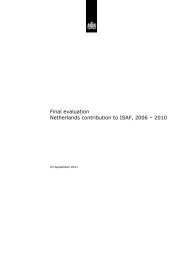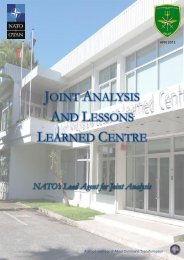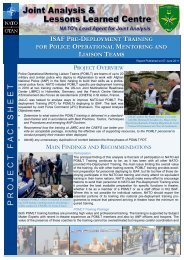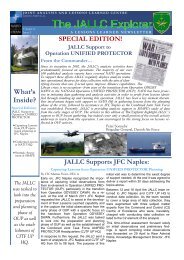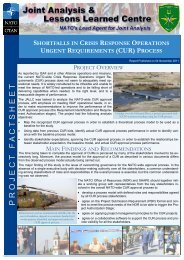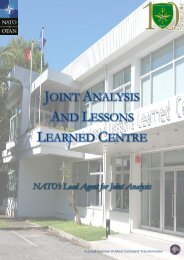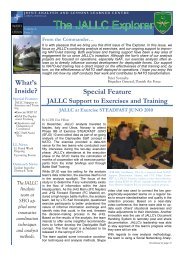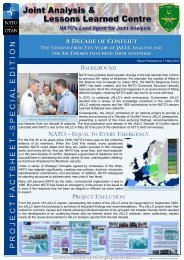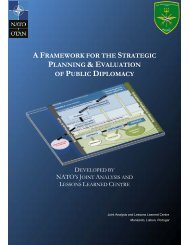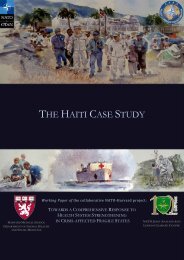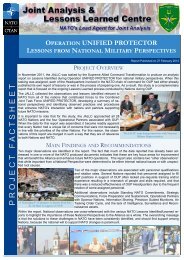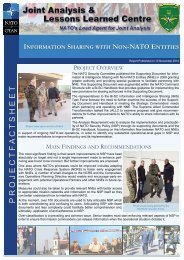Volume 3 Issue 1 - Joint Analysis and Lessons Learned Centre
Volume 3 Issue 1 - Joint Analysis and Lessons Learned Centre
Volume 3 Issue 1 - Joint Analysis and Lessons Learned Centre
You also want an ePaper? Increase the reach of your titles
YUMPU automatically turns print PDFs into web optimized ePapers that Google loves.
JALLC Newsletter<br />
J O I N T A N A L Y S I S & L E S S O N S L E A R N E D C E N T R E<br />
<strong>Volume</strong> 3, <strong>Issue</strong> 1 January 2012<br />
Military Health Care Engagement Project Update<br />
Haiti Case Study<br />
<strong>Joint</strong> Study with Harvard University nears completion of first milestone<br />
by Lt. Comm<strong>and</strong>er. André Thouvenel FRA N<br />
A joint team from Harvard University’s Department of Global<br />
Health <strong>and</strong> Social Medicine, Harvard Humanitarian Initiative<br />
<strong>and</strong> JALLC deployed to Haiti in December under the framework<br />
of the ongoing project on Military Health Care Engagement.<br />
Haiti represents the first case study of this analysis<br />
project that aims to identify options <strong>and</strong> limitations for comprehensive<br />
civil-military reconstruction <strong>and</strong> stabilization efforts<br />
with a focus on health care.<br />
Almost two years after the 12 January 2010 earthquake <strong>and</strong><br />
more than one year after the outbreak of cholera, the joint<br />
team had the opportunity to collect data in Port-au-Prince,<br />
Léogane, <strong>and</strong> Mirebelais, through interviews of key actors<br />
involved in the response to the disaster, in particular Haitian<br />
authorities from the Ministry of Health, civilian <strong>and</strong> military<br />
staff members of the UN Stabilization Mission in Haiti<br />
(MINUSTAH), UN Agencies, numerous NGOs, <strong>and</strong> representatives<br />
from a number of embassies.<br />
Downtown Port-au-Prince: two years later <strong>and</strong> signs of<br />
the earthquake can be seen everywhere.<br />
Page 4<br />
The <strong>Joint</strong> Team meets visits a displaced persons camp operated<br />
by the International Organization for Migration in Port-au-Prince.<br />
All persons visited willingly collaborated with the joint team <strong>and</strong><br />
thereby enabled the team to better underst<strong>and</strong> the military role in<br />
humanitarian assistance <strong>and</strong> disaster relief from the context of the<br />
response to the earthquake in Haiti <strong>and</strong> continuing development<br />
work in that country. The team was able to identify the existing <strong>and</strong><br />
developing civil-military coordination mechanisms during the response,<br />
<strong>and</strong> also to investigate the underlying relationship between<br />
Health <strong>and</strong> Security.<br />
The fruitful meetings <strong>and</strong> contacts also enabled the joint team to<br />
gain an overview on the role that new technologies played or could<br />
play for need assessment <strong>and</strong> disaster monitoring <strong>and</strong> to identify<br />
future areas where militaries could better support civilian efforts<br />
through engagement in the civilian health care sector.<br />
The study expects to provide policy makers with options for, <strong>and</strong> to<br />
identify potential limitations regarding, how to use military capabilities<br />
in concert with a comprehensive international effort. The partnership<br />
between Harvard University <strong>and</strong> JALLC ensures that the<br />
team can approach the project from civilian <strong>and</strong> military perspectives<br />
<strong>and</strong> backgrounds equally. Thus it is expected that the findings<br />
of this Haitian case study, to be released in early February, will be<br />
relevant <strong>and</strong> acceptable to both civilian <strong>and</strong> military audiences.<br />
JALLC<br />
JOINT ANALYSIS & LESSONS LEARNED CENTRE<br />
AVENIDA TENENTE MARTINS – MONSANTO<br />
1500-589 LISBON, PORTUGAL<br />
Phone: +351 21 771 7007/8/9<br />
Fax: +351 21 771 7098<br />
http://www.jallc.nato.int<br />
NATO’s Lead Agent for <strong>Joint</strong> <strong>Analysis</strong><br />
The <strong>Joint</strong> <strong>Analysis</strong> <strong>and</strong> <strong>Lessons</strong> <strong>Learned</strong> <strong>Centre</strong><br />
(JALLC) is NATO’s centre for performing joint<br />
analysis of operations, training, exercises <strong>and</strong><br />
Concept Development <strong>and</strong> Experimentation, including<br />
establishing <strong>and</strong> maintaining an interactive<br />
managed <strong>Lessons</strong> <strong>Learned</strong> Database.<br />
A proud member of Allied Comm<strong>and</strong> Transformation



